| Support independent journalism |
| |
|
| 
|  | | | | First Thing: ‘I’m not supplying the weapons’ if Israel assaults Rafah, warns Biden | | WHO says southern Gaza hospitals are running out of fuel. Plus, Bernie Sanders reveals bill to tackle $220bn in US medical debt | |  |  Aftermath of an Israeli strike on a house in Rafah, 9 May. Photograph: Hatem Khaled/Reuters
| | Jem Bartholomew
| | | Good morning. Joe Biden publicly warned Israel that the US would stop supplying it weapons if Israeli forces launch a major assault on Rafah – the last remaining city in Gaza that has not been razed in the Israeli offensive. “I made it clear that if they go into Rafah ... I’m not supplying the weapons,” the president told CNN. Biden also acknowledged US weapons have been used by Israel to kill civilians in Gaza. Israel this week ordered Palestinians to leave parts of Rafah – where 1.4 million people are sheltering – and attacked the city, claiming control of a key border crossing. Israel described it as a “limited” operation. Meanwhile, the head of the World Health Organization said hospitals in southern Gaza had only three days of fuel left. What pressure is the US applying on Israel? US diplomacy appears to have failed to stop a Rafah invasion, so Biden is now speaking publicly. In an analysis, the Guardian’s world affairs editor Julian Borger writes that the decision “sends a message to Netanyahu that the US dog is beginning to regain control of its tail”. What is the humanitarian toll of the war? After Hamas killed about 1,200 people and took 200 hostage on 7 October, Israel’s onslaught on Gaza has killed almost 35,000 people – mostly civilians – and displaced about 80% of the 2.3 million population. Northern Gaza is experiencing “full-blown famine”, according to the UN World Food Programme. Will this really make a difference? The IDF do not need these bombs to invade Rafah. They have more than enough stockpiles to reduce it to rubble. But US officials are talking of this as a hinge point in the US-Israel relationship, Julian Borger reports from DC.
Stormy Daniels to return to stand for second day of testimony at Trump trial | | |  |  Artist’s impression of Stormy Daniels testifying in a Manhattan criminal court on Tuesday. Photograph: Elizabeth Williams/AP
| | | | Donald Trump’s hush-money trial will resume on Thursday with more testimony from Stormy Daniels, the adult film star whose brief alleged affair with the former US president has already been the subject of much salacious questioning by prosecutors. Daniels will continue being cross-examined by Trump’s legal team. The relationship between Trump and Daniels is central to the case because Trump’s then lawyer and personal fixer, Michael Cohen, paid her $130,000 to keep quiet about their alleged sexual encounter during the 2016 election campaign. Bernie Sanders and Ro Khanna reveal bill to ‘cancel all medical debt’ | | | 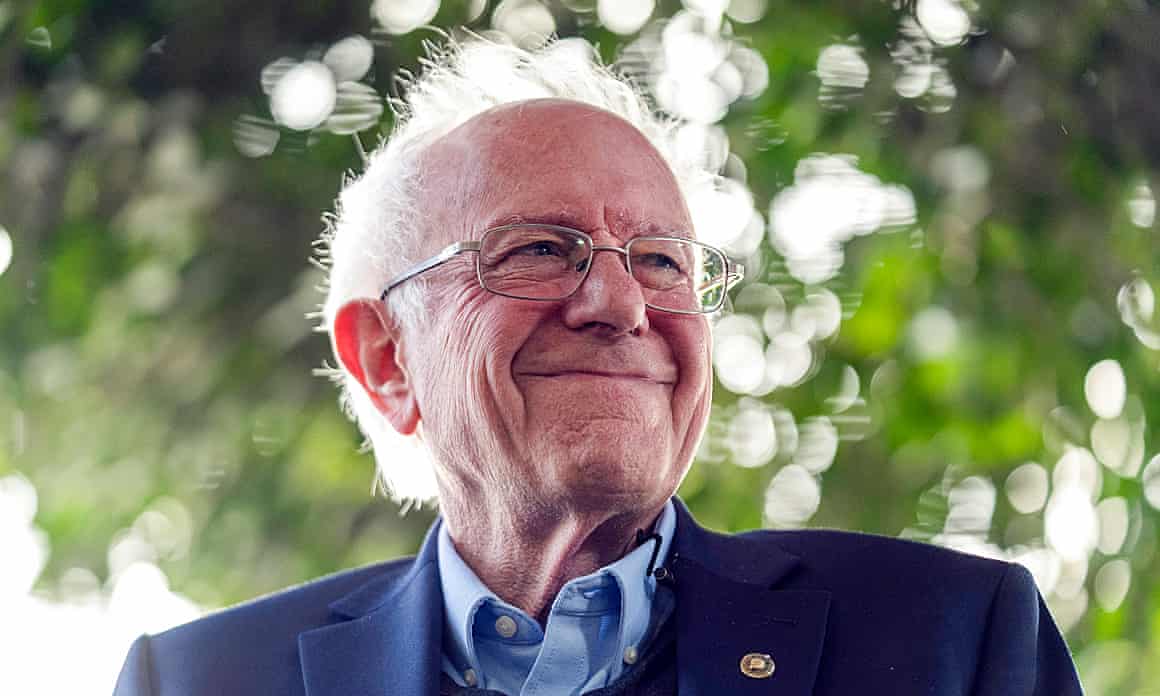 |  “The time has come to cancel all medical debt and guarantee health care to all as a human right, not a privilege,” Bernie Sanders said. Photograph: Damian Dovarganes/AP
| | | | Vermont senator Bernie Sanders and California congressman Ro Khanna on Wednesday revealed a bill aimed at eliminating medical debt. The bill would create a federal grant program to cancel all existing patient debt, and block creditors from collecting past medical bills. “This is the United States of America, the richest country in the history of the world. People in our country should not be going bankrupt because they got cancer and could not afford to pay their medical bills,” Sanders said. What’s the scale of the medical debt crisis? According to a 2022 investigation by NPR and KFF Health News, more than 100 million Americans, 41% of adults, hold some kind of healthcare debt. A KFF analysis of Census Bureau data found Americans owed at least $220bn in medical debt. Who’s most impacted by medical debt? Disproportionately, marginalized groups – 13% of Black Americans report having medical debt, compared with 7% of white Americans. What are people’s views on medical debt relief? A 2022 YouGov survey found 66% of Americans – 56% of Republicans and 85% of Democrats – support some medical debt relief.
House quashes Marjorie Taylor Greene motion to oust speaker Mike Johnson | | | 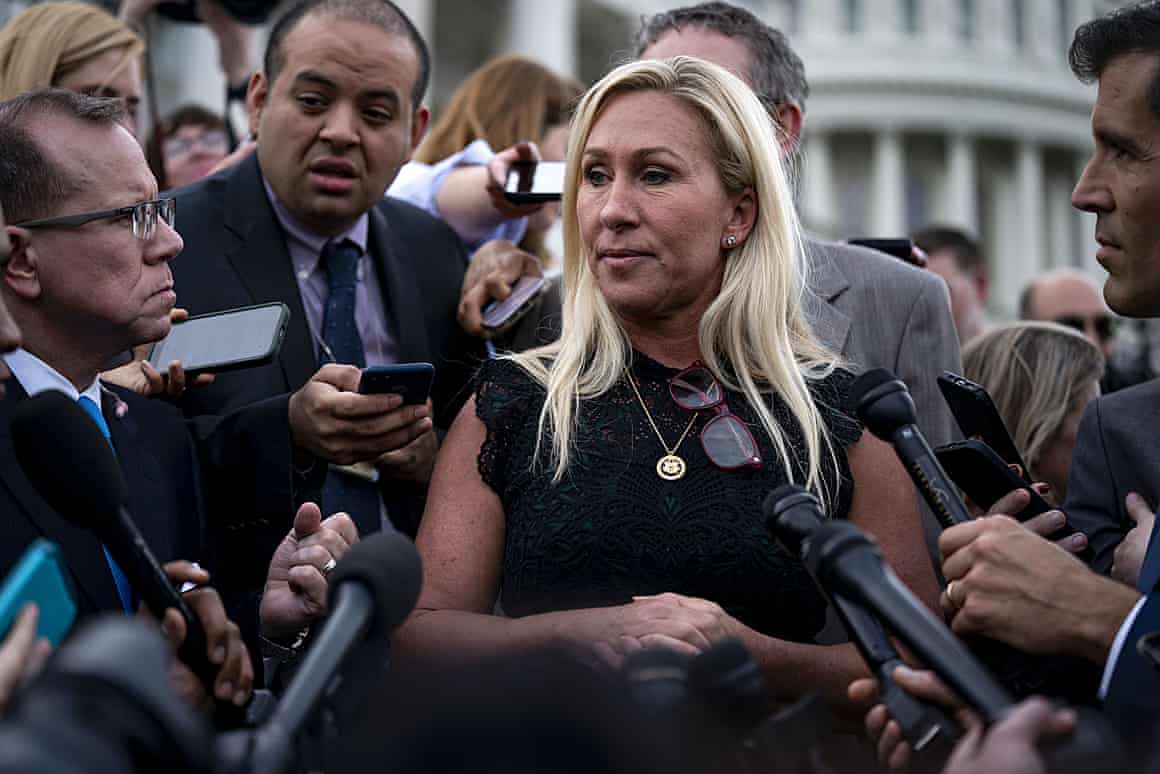 |  Majorie Taylor Greene. Photograph: Bonnie Cash/UPI/REX/Shutterstock
| | | | The House quashed Congresswoman Marjorie Taylor Greene’s resolution to oust the Republican speaker, Mike Johnson, on Wednesday, as members of both parties came together to keep the chamber open for business. The vote on the motion to table Greene’s resolution was 359 to 43, as 196 Republicans and 163 Democrats supported killing the proposal. Greene prompted boos from fellow Republicans present in the chamber. Greene’s maneuver appeared to catch many Republicans off guard, after the hard-right congresswoman spent much of the past few days meeting with Johnson to address her concerns about his leadership. Why did Taylor Greene bring the motion? She has repeatedly criticized Johnson for passing bills, including a government funding proposal and a foreign aid package, by relying on Democratic support. What explains the rare moment of bipartisanship? The Republicans who rallied around Johnson accused Greene of promoting chaos in the House. The episode came less than a year after the ouster of former Republican speaker Kevin McCarthy.
Trinity College Dublin agrees to divest from Israeli firms involved in occupation after student protests | | | 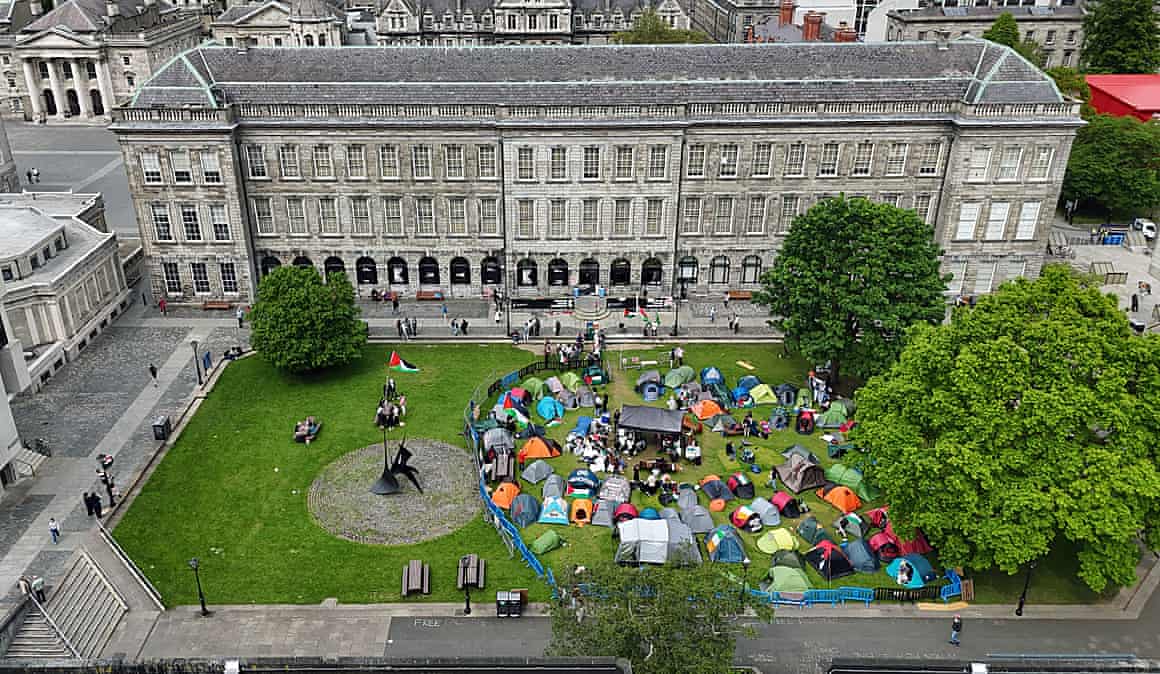 |  A Gaza solidarity encampment at Trinity College Dublin. Photograph: Niall Carson/PA
| | | | Students at Trinity College Dublin have ended a five-day Gaza solidarity encampment, after the university pledged to cut ties with occupation-involved Israeli companies. Student leaders claimed victory on Wednesday night for a campaign that disrupted the campus and blocked access to tourist attractions. “Trinity will complete a divestment from investments in Israeli companies that have activities in the Occupied Palestinian Territory and appear on the UN blacklist,” a university statement said. Here’s how it differed from US responses to encampments: In contrast to police forcibly evicting demonstrators, there was no attempt to remove the protest. Eoin O’Sullivan, a senior dean, thanked students for their “engagement”. Here’s how the students achieved their demands: The encampment closed campus to the public, costing the college an estimated €350,000 ($375,000) in forfeited revenue from visitors to medieval manuscript the Book of Kells. “I think the loss of revenue was key,” said one student.
In other news … | | |  | | | A Boeing cargo plane was forced to land at Istanbul airport without its front landing gear. No one was hurt but it’s the latest setback for the planemaker. An 18-month-old child in the UK had her hearing restored in a pioneering gene therapy trial. Doctors say it’s a new era for deafness treatments. Former New York City mayor Rudy Giuliani struggles to find an accountant in his bankruptcy case. A filing said “no one seems interested in taking the assignment”.
Stat of the day: Over 300,000 migrants are trapped in Yemen, IOM says | | | 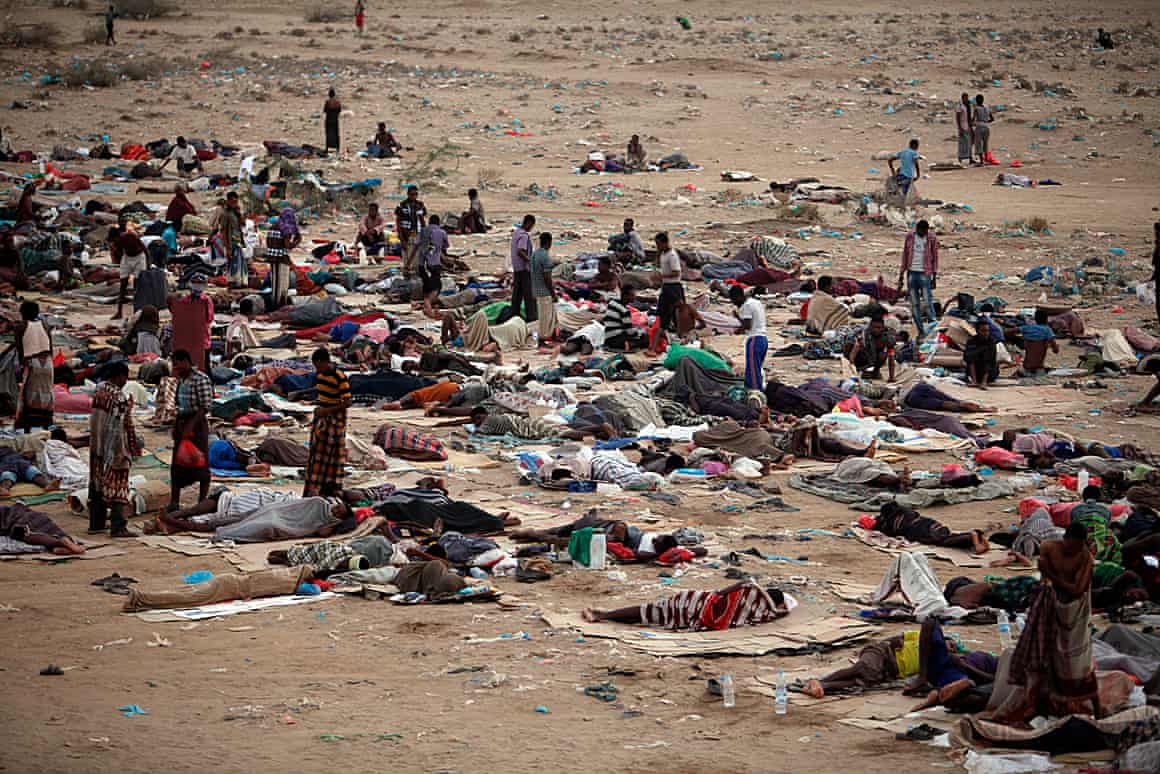 |  Ethiopian migrants sleep near a Yemeni transit centre where they wait to be repatriated. Photograph: Khaled Abdullah Ali Al Mahdi/Reuters
| | | | The number of African migrants stranded in Yemen, many enduring “horrifying and brutal” treatment, is reaching critical levels, international NGOs say. The International Organization for Migration estimated there are 308,000 migrants in Yemen. It follows multiple fatal boat journeys from Djibouti, a major transit point for people trying to reach Saudi Arabia. Don’t miss this: Judges with machine guns - the part-time drone hunters defending Kyiv | | |  |  Yevhen Miezientsev (left) on top of a high-rise apartment block in Kyiv. Photograph: Alessio Mamo/The Guardian
| | | | The “Mriya” unit, made up of members of the legal profession, patrols the capital region’s skies with antique weapons. Its task is to shoot down drones before they can reach the Ukrainian capital. “Putin could try and seize Kyiv again. But we are better prepared than two years ago,” one unit member tells Luke Harding. Climate check: Disease and hunger soar in Latin America after floods and drought, study finds | | | 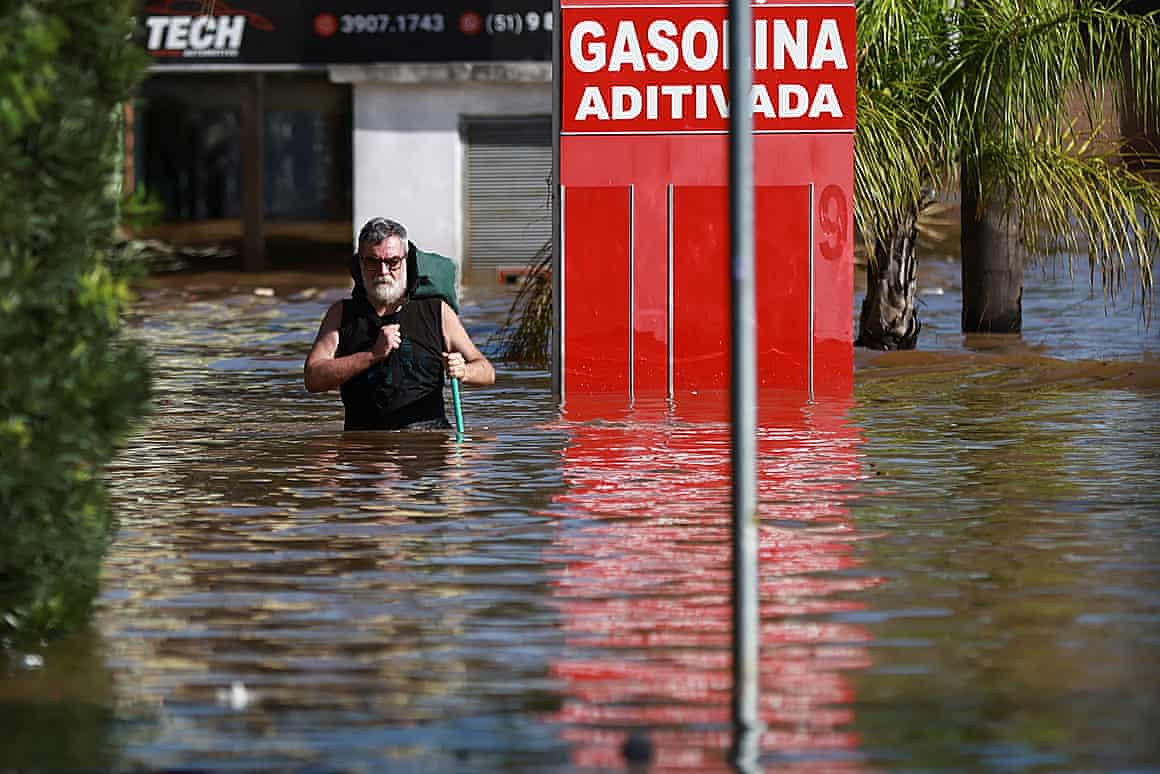 |  A man walks in a flooded street in Humaita, in Porto Alegre, Rio Grande do Sul, Brazil. Photograph: Diego Vara/Reuters
| | | | Hunger and disease are rising in Latin America after a year of record heat, floods and drought, says a report by the World Meteorological Organization. The continent likely suffered tens of thousands of climate-related deaths in 2023, at least $21bn economic damage and “the greatest calorific loss” of any region, the study found. Last Thing: Start making scents – how brands use smells to sell products | | |  |  The distinctive scents of Subway and Aesop waft into the streets. Photograph: AP/Guardian Design
| | | | Stores that sell items with distinctive smells, like perfumeries and bakeries, have been pumping smells into streets a long time. But starting in the 1990s, “sense marketing” became a more organized discipline, and now dozens of firms help store owners develop custom smells. Sign up | | | | | | First Thing is delivered to thousands of inboxes every weekday. If you’re not already signed up, subscribe now. Get in touch If you have any questions or comments about any of our newsletters please email newsletters@theguardian.com | |
| | | Betsy Reed | | Editor, Guardian US |
|  |
| | I hope you appreciated this newsletter. Before you move on, I wanted to ask if you would consider supporting the Guardian’s journalism as we enter one of the most consequential news cycles of our lifetimes in 2024.
From Elon Musk to the Murdochs, a small number of billionaire owners have a powerful hold on so much of the information that reaches the public about what’s happening in the world. The Guardian is different. We have no billionaire owner or shareholders to consider. Our journalism is produced to serve the public interest – not profit motives.
And we avoid the trap that befalls much US media: the tendency, born of a desire to please all sides, to engage in false equivalence in the name of neutrality. We always strive to be fair. But sometimes that means calling out the lies of powerful people and institutions – and making clear how misinformation and demagoguery can damage democracy.
From threats to election integrity, to the spiraling climate crisis, to complex foreign conflicts, our journalists contextualize, investigate and illuminate the critical stories of our time. As a global news organization with a robust US reporting staff, we’re able to provide a fresh, outsider perspective – one so often missing in the American media bubble.
Around the world, readers can access the Guardian’s paywall-free journalism because of our unique reader-supported model. That’s because of people like you. Our readers keep us independent, beholden to no outside influence and accessible to everyone – whether they can afford to pay for news, or not. | | If you can, please consider supporting us just once from $1, or better yet, support us every month with a little more. Thank you. | | |
|
|
| | |
| 
| Manage your emails | Unsubscribe | Trouble viewing? | | You are receiving this email because you are a subscriber to First Thing: the US morning briefing. Guardian News & Media Limited - a member of Guardian Media Group PLC. Registered Office: Kings Place, 90 York Way, London, N1 9GU. Registered in England No. 908396 |
|
|
|
|
|